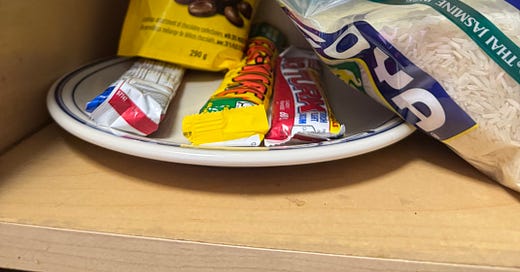I’m not a big vitamin or stack person for a few reasons. Partly out of stasis—I ran out a while back and didn’t notice when I didn’t refill as it was during a period of dialing in my diet. As I ran out I didn’t notice. Not exactly double-blind, but I just never re-upped.
There are a couple of arguments against supplementation as the thing you do to get “healthy.” Grammatically—supplement…. very correct: supps, vitamins are to boost a diet, help in health. They can’t be the foundation… “health”itself is a choice… a process that involves (roughly) movement, strength, nutrition, purpose and light.
The Occam’s razor argument against: High zinc foods (say, oysters) are more “bioavailable” (they get into your body quicker, and therefore, kinda, do more) than that nutrient ground up, in a bottle. And the safety argument: real foods contain fewer (or no) metals whereas titanium and so on can be common in industrial vitamin and nutrient production. Who wants that?
The holistic/Chad/usage/Occam’s razor arguments are intuitive, but the metals one can feel bleak. It’s half scare-mongering. And even if those things are true, you can’t make people shook about everything. You can’t worry about things you cannot avoid. (This is a subject for another post.) Mostly it’s incomplete context: Our food system—not just supps—is so opaque and has so many inputs that if you look, in depth, at how anything is made, you will find truths you cannot sit with. It’s like going into a restaurant’s kitchen. Why would you do that if you’re eating there? In an industrial food system, ignorance doesn’t lead to health, but it does help with sanity.
Instead, the limited Chad skepticism for supplementation to me is a positive: It creates a sane incentive to set up a very good diet. Conscious food choices… over time… when you can do it, and not necessarily expensive. This diet-first approach is nice and sane. It’s a net benefit.
Soil degradation ties it all in
But there are certainly use cases for supplementation, and an explanation why people, whether they’re DN or not, veer towards supps. Effectively: we’re all eating, the dark nutrition argument says, in the context of soil degradation. The dirt where fruits, vegetables grow and on which cows graze, because of over-farming and pesticides, is of much lower quality now than in the past. Maybe worthless? (Not just DN, but scientifically: Soil is so bad now that a third of U.S. farmers’ fertilizer usage compensates for its poor quality; there are arguments that this bad dirt will make the world run out of water.)
On a consumer level this means kiwis have less vitamin E now than they did decades ago, and bananas are different. And so on for just about everything. There’s a lot to this—good to eat more nutrient-dense foods and to buy organic, though, of course, not everybody can do that—but on a non-prescriptive level it explains why we feel like we need… nutrients and supplements. Soil degradation is the context here, and an opportunity for humility. Even the most dialed in diet, even the most righteous nutritional person who does all the “right things” may be patchy somewhere. Which is nice; if things are not perfect, they can get better.
Vitamin and nutrient timing
Not so much what to use but when to use. If we’re making up for soil degradation we can’t just patch it over with pills forever. Dark nutrition heads, the good ones, tend to take supplements during certain points in time: tough workout blocks, winter, when groceries are harder to stay on top of… on flight days/if flying a lot, immediately after eating out at a restaurant (seriously). Basically: one vite or supp—one experiment at a time—could be worth a shot if the big things are nailed down but something is missing.
Which ones, how long
So—what supps? My preference is for more natural ones, but my real preference is over a short time period. Repeating it because it’s important. Vitamins are not about what but when. A patch for a specific period of time that maybe fixes or diagnoses a problem. More specifically, time matters since adding a specific nutrient can decrease the ability of its “paired nutrient” to get into the bloodstream. Too much of one hurts the other. (Too much vitamin E can deplete vitamin K, which helps blood clot—some studies involving this—and zinc (good for immunity) can antagonize copper—further reading on that.)
Which is crazy (to me crazier than drinking raw milk) but if it’s limited to one, and tracked over a short period of time then it’s… well, not. It can be walked back. If it doesn’t work, cut it out; if it does “work,” taper it off and see if you still need it, or try getting more of it through real food. And then take time and conservatively go onto the next one.
Below supps I cycle in and take depending on workout frequency, travel, and in situations in which restaurant food (vegetable oils) can’t be avoided. Mostly weighted towards herbal/natty, but in some cases not. In all cases, an extra thing to try that is more “specific” and isolated than a grocery food:
Keep reading with a 7-day free trial
Subscribe to SNAKE SUPER HEALTH to keep reading this post and get 7 days of free access to the full post archives.





